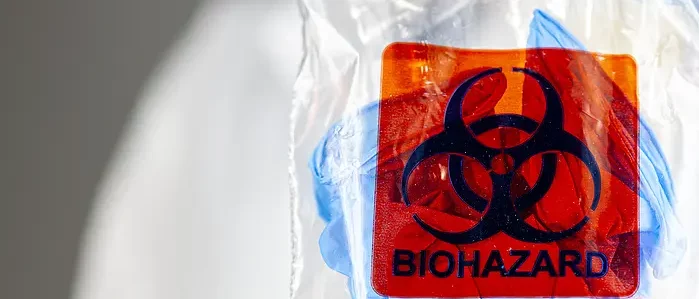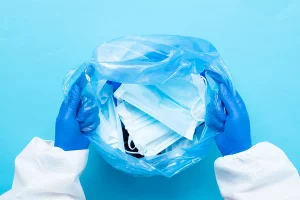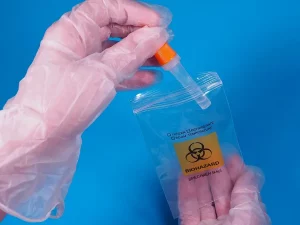The Greatest Danger of Medical Waste is Improper Disposal

American hospitals generate approximately 6 million tons of waste annually. According to the World Health Organization (WHO), around 15% of this waste falls into the hazardous, infectious, and radioactive waste categories. However, the greatest danger of medical waste is to dispose of it improperly.
Waste from these categories requires special handling and disposal to prevent negative health and environmental impacts. Taking safety precautions can prevent the unintended release of chemicals or biological hazards, the spread of disease, injury, and much more. In the article below, we will navigate the 4 four categories of medical waste, their specific dangers, and how improper medical waste disposal impacts human life and the environment around us.
Types of Waste and Dangers of Each
Medical waste is garbage and waste materials created while running and treating patients in hospitals, clinics, and other healthcare settings. Medical waste can be divided into 4 main categories: general waste, hazardous, infectious, and radioactive. Each type requires its own handling and disposal methods to maintain legal compliance and protect anyone who may come into contact with waste.
General Medical Waste

General medical waste is the least dangerous of the 4 categories of medical waste. It also constitutes the largest waste stream coming from hospitals and medical facilities. It includes items like paper, plastic, and other office waste.
The main risks associated with general medical waste are no different than typical household waste. The general concern is plastics and other materials contaminating the land and oceans. Therefore, recyclable materials like paper and plastics should be recycled when possible to keep waste out of landfills. Other than that, it does not require special handling or disposal.
Hazardous Waste
Hazardous waste is dangerous, but usually non-infectious. It is defined by its ability to easily ignite, corrode other materials, react explosively, or become toxic when mixed with other materials, and/or anything that can cause harm if ingested or absorbed. Common types of hazardous waste are chemicals, medications, and sharps.
The dangers of hazardous waste are injury or harm to humans and environmental impacts. Improperly handled sharps can cause needle stick injuries for sewage and waste workers, not to mention children and animals. Pharmaceuticals and chemicals can seep into the ground, contaminating soil and water. Hazardous pollution in the ground causes substantial risk to animal and plant life, affecting human life in the surrounding ecosystems.
Infectious Waste

Infectious waste, also known as pathological waste, refers to waste that could potentially be infectious to humans and animals. It includes blood and blood products, tissues or body parts, bodily fluids, used sharps, and laboratory waste.
The obvious risk of infectious waste is the spread of disease. Healthcare and waste workers should be trained annually in the safe handling and disposal of infectious waste to prevent exposure to infection for themselves or others.
Radioactive Waste
Radioactive waste is generated from radioactive treatments, cancer therapies, nuclear medical treatments, medical equipment, clothing, and biological materials. It is harmful to both humans and the environment because it emits radioactive particles. Emitted radiation can vary widely from a few seconds to decades.
When radioactive waste is not handled and disposed of properly, it can lead to severe injuries like burns and the destruction of tissue. If exposed to large amounts of radiation, humans and animals develop a higher risk for certain cancers, radiation illness, and death. Radiation also contaminates the environment by poisoning the air, water, and soil.
The Greatest Danger of Medical Waste: Improper Disposal
Medical waste can cause harm when not properly handled or disposed of. Not only can it cause harm to humans, but the environmental impact can have huge repercussions on animal and ecological life. Furthermore, there are also legal consequences to consider.
Human Health Impact
Potential health hazards created by medical waste are greatest at the point of collection and naturally decrease over time. This means that healthcare workers are at the greatest risk for exposure to infection and require comprehensive training to stay safe.

Janitors, housekeepers, and waste workers are next in line when it comes to risk. Loose sharps and bodily fluids can poke or leak through trash bags, possibly transmitting serious diseases. Inadequate disposal can lead to several dangerous conditions including:
- Human immunodeficiency virus (HIV)
- Hepatitis B and C
- Lung infections
- Skin infections
- Parasitic Infections
- Cholera
- Bacteremia
- Tuberculosis
Proper collection and disposal of medical waste minimizes infection and injury risks for healthcare workers and those who may come in contact with medical waste.
Environmental Impact
Medical waste can be dangerous for animals and the environment as a whole. Improperly disposed of waste ends up polluting the soil, air, and precious water sources. Proper treatment methods like incineration keep hazardous and waste materials out of our landfills and oceans.
- Pharmaceutical waste can wipe out entire populations of wildlife, especially if they are brightly colored, attracting birds and other animals.
- Loose sharps can puncture trash liners, allowing medical waste and liquids to seep into the groundwater and soil.
- Radioactive and other wastes can become airborne, carrying pollutants and airborne diseases to anyone who breathes in the surrounding air.
Legal Consequences
All medical waste generators are held to federal and state regulations. Non-compliance may result in financial and civil penalties. Here is a list of agencies that regulate medical waste disposal:
- The Environmental Protection Agency (EPA) – is the primary regulating agency for federal programs regarding medical waste disposal.
- The Drug Enforcement Agency (DEA) – creates regulations regarding the handling and disposal of controlled substances.
- The US Food and Drug Administration (FDA) – guides the disposal of unused medications.
- The Occupational Safety and Health Administration (OSHA) – regulates the handling of bloodborne pathogens, worker safety, and labelling of medical waste.
- Department of Transportation (DOT) – oversees regulations for the sorting, packaging, and transportation of medical waste.
Fines for violating medical waste disposal laws can range from $1,000 per infraction to $93,000 and can include jail time. It also harms your ability to treat patients by damaging your reputation and even shutting down your operations temporarily or permanently.
Get Free Quotes on Medical Waste Disposal Services
Avoid the greatest dangers of medical waste with proper disposal services from Medical Waste Pros. We will help you find reliable medical waste disposal providers in your area. Please give us a call at (855)-755-6370 or fill out the form to receive free quotes on our medical waste disposal services within minutes.










